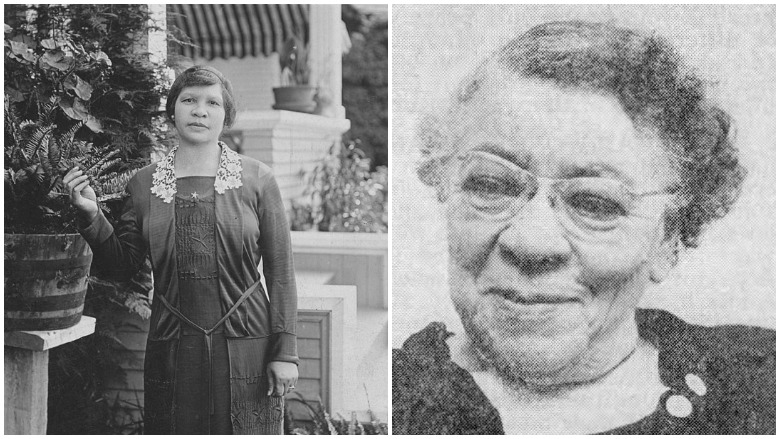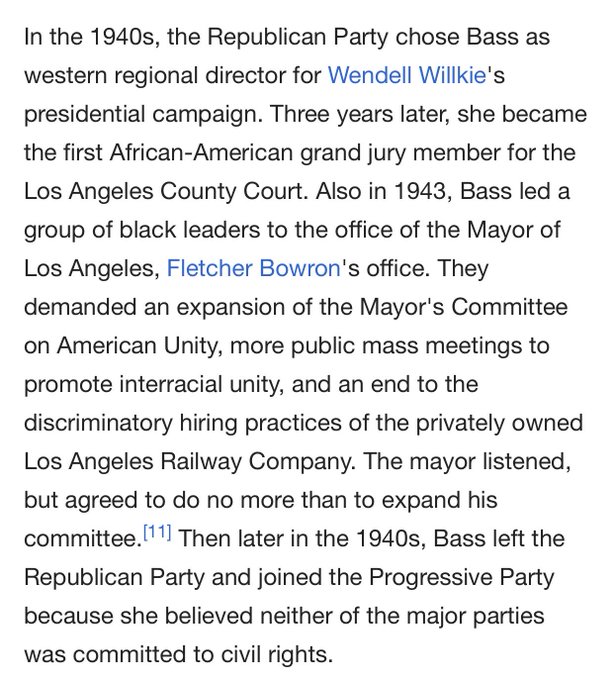
Wikimedia Commons Charlotta Bass was an activist with many of the same platform issues politicians are running on today.
Charlotta Bass was an educator, civil rights activist, newspaper owner and vice-presidential candidate during an era where few Black women were involved in mainstream politics.
In light of Kamala Harris‘ history-making nomination as vice president, many have been searching for information about Bass, the first Black female vice-presidential candidate and a legend of California progressivism.
According to what Rutger’s University Jean Sinzdak told USA Today, “It’s historic this run that Kamala Harris is doing today, but she really stands on the shoulders of people like Charlotta Bass,” she said. “We’re sort of at the culmination of this moment that’s built on decades of Black women’s political activism.”
Here’s what you need to know:
1. Bass Was One of Eleven Children
According to the National Park Service, Charlotta Amanda Spears was born in Sumter, South Carolina on February 14, 1874, the sixth of eleven children. She moved away from her parents, Hiram and Kate Spears in 1894 to live with her brother in Providence, Rhode Island and began her career in the newspaper industry.
Bass started out at the Providence Watchman, a Black-owned newspaper where spent a decade selling ads, the National Park Service reported. Later on, while working in California, she met her future husband, Joseph Blackburn Bass. The two would marry and work in tandem raising issues of civil rights and racial equity.
Throughout her life, she was good friends with activist Paul Robeson and W.E.B. Du Bois. She wrote about her life in a 1960 autobiography titled, “Forty Years: Memoirs from the Pages of a Newspaper.” According to Black History Now, Bass suffered a stroke in 1966 and three years later, she died of a cerebral hemorrhage.
2. Bass Was A Newspaper Owner
In 1910, Bass moved to Los Angeles, California and sold subscriptions to the Eagle, another Black-owned newspaper, Black History Now reported. Two years in, Eagle publisher J. J. Neimore, who was sick, asked Bass if she would be the owner of the paper after his death, to which she agreed. According to Black History Now, they reported that Bass was “the first African American woman to run a newspaper in the United States.”
Bass was not only the first but also incredibly adept, according to the National Park Service; she was responsible for changing the paper’s name to the California Eagle, expanding its coverage to daily issues as well as those supporting causes and helped it recover from the dire financial straits it was in when she first took ownership of it. The Park Service reported that, “By the 1930s, the California Eagle was the largest African American paper on the West Coast. It stood on solid financial grounds, had a circulation of nearly 60,000, and took on important editorial stands.”
During her acceptance speech to be the Progressive Party’s vice presidential nominee later in life, Black Past reported Bass’ remarks on her newspaper career:
For 40 years I have been a working editor and publisher of the oldest Negro newspaper in the least. During those 40 years I stood on a watchtower, watching the tide of racial hatred and bigotry rising against my people and against all people who believe the Constitution is something more than a piece of yellowed paper to be shut off in a glass case in the archives, but living document, a working instrument for freedom.
Yes, during those 40 years, the Eagle stirred her nest, led the struggles of my people, taught them to work with labor as the one group that could help break down racial differences and open the door for Negro people. I have stood watch over a home to protect a Negro family against the outrages of the Ku Klux Klan. And I have fought the brazen attempts to drive Negroes from their homes under restrictive covenants. I have challenged the great corporations which Negroes in their plants. I have stormed city councils and state legislatures and the halls of Congress demanding real representation for my people.
For nearly 30 years, Bass was the editor of the California Eagle, writing in support of women’s suffrage; labor issues, such as the Black nurses strike; improved education; and addressing police brutality, USA Today reported. The paper also went after companies practicing discriminatory hiring and “restrictive covenants” designed to racially segregate Black Americans looking for housing, PBS reported. She also vehemently protested the D.W. Griffith’s movie, “Birth of A Nation” for its racist caricatures of Black men and glorification of domestic terrorism in the Ku Klux Klan.
Bass retired as the paper’s owner and editor in 1951 and sold it to an attorney and former Eagle reported named Loren Miller, according to PBS.
3. Bass Was Heavily Involved in Civil Rights
Bass had dipped her toe in politics during her later years as the editor, Black History Now reported, and owner of the Eagle by running for Los Angeles City Council in 1945 and becoming the Progressive Party candidate for state senate in 1950, losing both races. But although Bass had become much more politically active after her husband died in 1934, but it was retirement that allowed her to fully commit herself to the craft.
Bass participated in the NAACP, Urban League, Civil Rights Congress, United Negro Improvement Association and also founded the National Sojourner for Truth and Justice Club, the National Park Service reported.
During her speech accepting the Progressive Party’s nomination as vice president, Bass reportedly contrasted how Black soldiers were treated after returning home from war:
I shall tell you how I come to stand here. I am a Negro woman. My people came before the Mayflower. I am more concerned with what is happening to my people in my country than in pouring out money to rebuild a decadent Europe for a new war. We have lived through two wars and seen their promises turn to bitter ashes. Two Negroes were the first Americans to be decorated for bravery in France in World War I, that war that was fought to make the world safe for democracy. But when it ended, we discovered we were making Africa safe for exploitation by the very European powers whose freedom and soil we had defended. And that war was barely over when a Negro soldier, returning to his home in Georgia, was lynched almost before he could take off his uniform. That war was scarcely over before my people were stoned and shot and beaten in a dozen northern cities. The guns were hardly silenced before a reign of terror was unloosed against every minority that fought for a better life.
And then we fought another war. You know Dorie Miller, the spud peeler who came out of his galley to fight while white officers slept at Pearl Harbor. And I think of Robert Brooks, another “first Negro”, and of my own nephew. We fought a war to end fascism whose germ is German race superiority and the oppression of other peoples. A Negro soldier returned from that war—he was not even allowed to take off his uniform before he was lynched for daring to exercise his constitutional right to vote in a Democratic primary.
I have fought not only for my people. I have fought and will continue to fight unceasingly for the rights and privileges of all people who are oppressed and who are denied their just share of the world’s goods their labor produces. I have walked and will continue to walk in picket lines for the right of all men and women, of all races, to organize for their own protection and advancement. I will continue to cry out against police brutality against any people, as I did in the infamous zoot suit riots in Los Angeles in 1944, when I went into dark alleys and reached scared and badly beaten Negro and Mexican American boys, some of them children, from the clubs and knives of city police. Nor have I hesitated in the face of that most unAmerican Un-American Activities Committee—and I am willing to face it again. And so help me God, I shall continue to tell the truth as I know it and believe it as a progressive citizen and a good American.
Bass maintained this demand for racial and gender equity and respect throughout her political career.
4. Bass Was Nominated Vice President for the Progressive Party
In 1952, Bass was nominated to be the vice-presidential candidate for the Progressive Party, which had been established by Henry A. Wallace, a former Democrat dissatisfied with the aggressive nature of American foreign policy. According to USA Today, it was a party that “had an explicitly anti-racist platform that called for the end of lynching, fair housing, access to medical care.”
“You have called me to lead the fight against evil, the fight for human life and human dignity. I am indeed proud to answer the call of this party of progress,” she said during her 1952 speech. “I am stirred by the responsibility that you have put upon me. I am proud that I am the choice of the leaders of my own people and leaders of all those who understand how deeply the fight for peace is one and indivisible with the fight for Negro equality. And I am impelled to accept this call, for it is the call of all my people and call to my people.”
Bass, who was running alongside presidential candidate Vincent Hallinan, received 140,000 votes and lost to Dwight Eisenhower, USA Today reported.
Even though she lost her bid, she remained active in politics.
While living her later years in Lake Elsinore and writing her autobiography, Bass turned her garage into a community center, reading room and location of voter registration, Black History Now reported. She also joined protests against South African apartheid and championed the rights of prisoners.
5. Bass Was Monitored by the FBI & Accused of Being A Communist for Most of Her Political Life
Bass’ involvement with civil rights groups as well as her more left-leaning policies got the attention of the FBI, Black History Now reported, which put her under the suspicion of the FBI. According to USA Today, her passport was even confiscated at one point.
At the height of the McCarthyism era, Bass was asked to come before the California Legislature’s Joint Fact-Finding Committee on un-American Activities, whom she had criticized during her newspaper years. According to the Washington Post, Bass – who had switched from being a California Republican convention delegate to the Democratic Party, “denounced both major parties entirely. Both had neglected Black and women’s rights, she wrote in an editorial, by trying to prove their commitment to fighting communism in the era of Republican Sen. Joseph R. McCarthy’s Red Scare.”
The Post reported that Bass was routinely watched at public events and was even interrogated in her office. Although she was never found guilty of any actual wrongdoing but was under surveillance, “for the remainder of her life,” Black History Now reported.
READ NEXT: Here’s Ava DuVernay’s On Kamala Harris & Trump Calling Harris ‘Nasty’

